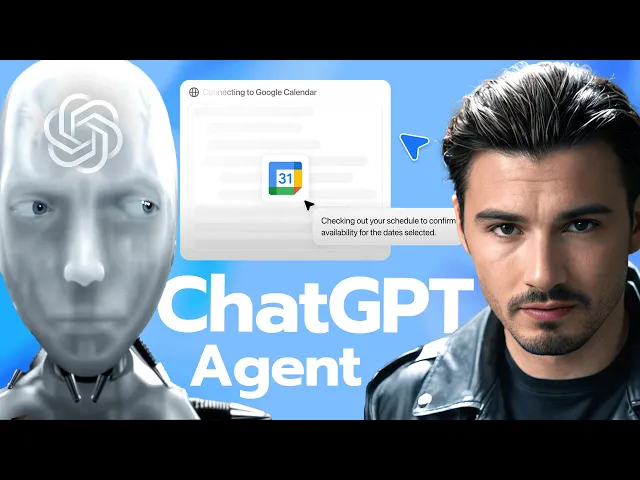ChatGPT Agent Full Breakdown & More AI Use Cases

ChatGPT agents give businesses AI superpowers
OpenAI's recent introduction of ChatGPT agents represents a significant evolution in how businesses can leverage artificial intelligence for both internal operations and customer-facing applications. These autonomous AI assistants can now perform multi-step tasks with remarkable independence, potentially transforming how organizations handle everything from customer service to data analysis.
Key Points
- ChatGPT agents can now operate autonomously to complete complex, multi-step tasks like research, coding, and data analysis without constant human supervision
- Agents can be customized with specific knowledge bases, personas, and capabilities to serve different business functions across departments
- The technology balances autonomy with control mechanisms, allowing businesses to set guardrails that determine what agents can and cannot do
- Real-world applications include customer service automation, knowledge management, and specialized data analysis that goes beyond simple chatbot interactions
Why This Matters: The Shift from Tools to Partners
The most profound insight from this development is how ChatGPT agents fundamentally change the relationship between humans and AI systems. We're witnessing a transition from AI as passive tools requiring constant direction to AI as collaborative partners that can take initiative within defined boundaries.
This shift matters tremendously in today's business landscape where attention is perhaps our scarcest resource. When executives and knowledge workers can delegate complex, multi-step tasks to AI agents that understand context and operate with appropriate autonomy, it creates a multiplication effect on human capability. Rather than manually shepherding AI through each step of a process, professionals can focus on higher-level strategy and decision-making while agents handle the execution details.
Consider how this compares to the evolution of human organizational structures. Just as executives don't micromanage every action their teams take, AI agents now operate with similar delegation principles—they understand objectives, work within guidelines, and deliver results without requiring continuous oversight.
Beyond the Video: Practical Applications and Considerations
Healthcare Operations Example
A hospital system could deploy customized ChatGPT agents to transform their administrative workflows. An "Insurance Verification Agent" could autonomously review patient insurance information, identify potential coverage issues, cross-reference with current policy databases, and generate detailed reports for billing staff—all before the patient arrives for their appointment. The agent could even communicate directly with patients via secure messaging to request additional information when needed, freeing clinical
Recent Videos
How To Earn MONEY With Images (No Bullsh*t)
Smart earnings from your image collection In today's digital economy, passive income streams have become increasingly accessible to creators with various skill sets. A recent YouTube video cuts through the hype to explore legitimate ways photographers, designers, and even casual smartphone users can monetize their image collections. The strategies outlined don't rely on unrealistic promises or complicated schemes—instead, they focus on established marketplaces with proven revenue potential for image creators. Key Points Stock photography platforms like Shutterstock, Adobe Stock, and Getty Images remain viable income sources when you understand their specific requirements and optimize your submissions accordingly. Specialized marketplaces focusing...
Oct 3, 2025New SHAPE SHIFTING AI Robot Is Freaking People Out
Liquid robots will change everything In the quiet labs of Carnegie Mellon University, scientists have created something that feels plucked from science fiction—a magnetic slime robot that can transform between liquid and solid states, slipping through tight spaces before reassembling on the other side. This technology, showcased in a recent YouTube video, represents a significant leap beyond traditional robotics into a realm where machines mimic not just animal movements, but their fundamental physical properties. While the internet might be buzzing with dystopian concerns about "shape-shifting terminators," the reality offers far more promising applications that could revolutionize medicine, rescue operations, and...
Oct 3, 2025How To Do Homeless AI Tiktok Trend (Tiktok Homeless AI Tutorial)
AI homeless trend raises ethical concerns In an era where social media trends evolve faster than we can comprehend them, TikTok's "homeless AI" trend has sparked both creative engagement and serious ethical questions. The trend, which involves using AI to transform ordinary photos into images depicting homelessness, has rapidly gained traction across the platform, with creators eagerly jumping on board to showcase their digital transformations. While the technical process is relatively straightforward, the implications of digitally "becoming homeless" for entertainment deserve careful consideration. The video tutorial provides a step-by-step guide on creating these AI-generated images, explaining how users can transform...
